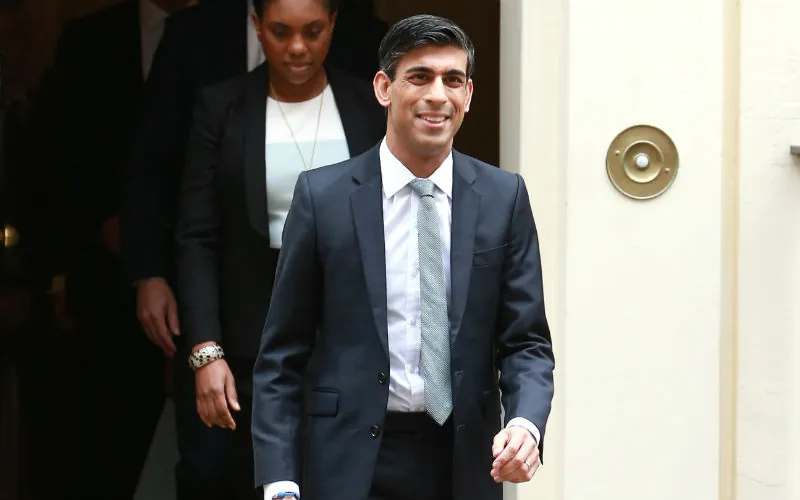The summer statement included a raft of measures to help get Britons back to work as lockdown is eased.
Chancellor Rishi Sunak’s first Budget in March was focused on saving the economy from crisis as COVID-19 spread rapidly around the country.
It introduced an emergency furlough scheme where companies could lay off their workers temporarily, with the government picking up 80% of their wages.
With that set to end in October, Sunak used his ‘mini-Budget’ summer statement to outline how the Treasury would help ease those people who are not ultimately made redundant back into work – and recruit others into training schemes and employment.
As part of the £2 billion Kickstart Scheme, the government will fund six-month job placements up to 25 hours a week for an estimated 350,000 18–to–24-year-olds.
The Treasury will also pay £2,000 for every new apprentice – £1,500 for those over the age of 25 – and £1,000 for traineeships, capped at 10 jobs per company.
There is also a £1,000 job retention bonus for every furloughed worker brought back.
How did the tech sector react?
Former Labour MP Chuka Umunna, a Non-Executive Director at Advanced, said: “We warmly welcome the Job Retention Bonus, Kickstart Scheme, traineeships, apprenticeship funding and other measures announced by the Chancellor today.
“There is always more that can be done but this is the kind of ‘big bazooka’ treatment the economy needs to help lift business out of this downturn and back to growth. These measures will undoubtedly not only help a business like ours, with over 2,000 employees, but our customer base too.”
Ritam Gandhi, founder and director at Studio Graphene, said: “The government’s commitment to subsidise work placements and traineeship programmes is a positive investment in young people’s futures, and will ease the burden on SMEs; particularly those who have perhaps put their hiring plans on hold due to the uncertainty caused by COVID-19. It is the stimulus small businesses need to bolster their workforce as they return to normality.
“That said, further tax breaks and economic incentives are needed if we hope to catalyse SMEs for sustained economic recovery. Despite the scale of the Chancellor’s efforts to date, the future of many small businesses still hangs in the balance and they cannot wait until the Autumn Budget for a bolder stimulus package.”
Fred Flack, Head of Talent Academy at CloudStratex, said: “With the UK economy forecast to shrink by almost 10% this year and unemployment to rise by at least the same amount, it is clear that investment in skills and training will be vital if we are to rebound from our present economic slump and see the first green shoots of recovery.
“Therefore the Chancellor’s ‘summer Budget’ is to be commended. If UK businesses are to remain competitive they clearly need highly skilled, competent individuals, especially if they are technically literate. Afterall, technology underpins key sectors such as finance and banking. health, retail, and manufacturing, which bolster the UK economy and ensure our global success.
“Most importantly though, the Chancellor has thrown a lifeline to many vulnerable young people who need support and training now more than ever, if they are to become the next generation of business technologists and leaders.”
Gregory Taylor, partner and head of financial solutions at MHA MacIntyre Hudson, said: “The Chancellor was good at outlining the next steps to help employees, but was silent on the other big pillar of the COVID-19 relief measures: business funding.
“Many businesses will be very concerned that no mention was made of either an extension to the Coronavirus Business Interruption Loan Scheme (CBILS) or an alternative solution to aid them in the second phase of the economic restart.
“Without this missing piece of the puzzle many businesses may lack the confidence to retain staff or begin trading fully. They need assurances from the government that working capital support will still be there heading into the autumn, when the CBILS scheme is due to end.”
Kai Feller, CEO and co-founder at services marketplace Bark.com, said: “We welcome the news that the government will step in to subsidise payments for small businesses. Schemes like furlough have and will continue to help a lot of businesses, however, those who will be unable to cover these payments when they wind down the scheme in October will be hit hardest.
“What’s missing is a sense of practical innovation. Something that hasn’t been suggested is a scheme to help small businesses adapt and get online, and to help them work remotely where they can. For many businesses, the demand is there, but they just can’t access it.
“For the more traditional business that wouldn’t normally operate online, or that might not be as tech-savvy as the younger generation, there needs to be proactive help and support to facilitate an easier transition to get them online.”
Jonathan Richards, CEO and founder of Breathe, said: “It’s encouraging to see the Chancellor incentivising businesses to bring their furloughed workers back considering 9.4m people have been furloughed in the UK.
“The challenge now is for businesses to manage workers as they get back to work, establishing a comprehensive rota system and consulting on the return to work is really important to manage expectations and the demands of running a business during the pandemic. Indeed, our recent research found 88% are not comfortable getting public transport to commute to work.
“Provisions for the hospitality sector announced in today’s summer statement will provide relief to small restaurants, pubs and cafes across the UK. Cutting VAT to 5% will encourage consumers to visit their local venues, allowing businesses to get back on their feet.”


